|
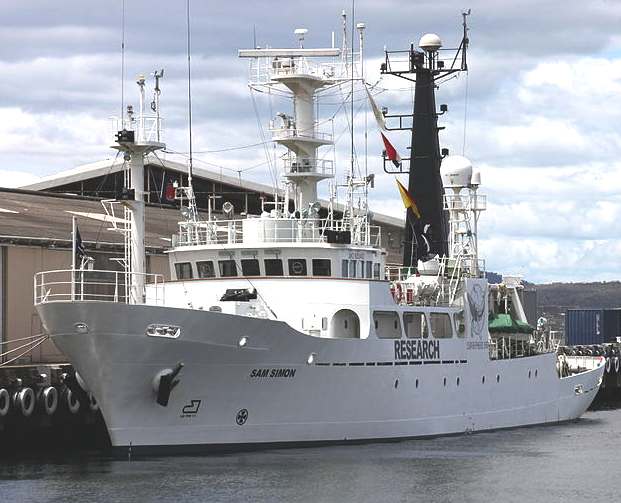
MY
SAM SIMON - The motor yacht Sam Simon is the fourth vessel of the Sea Shepherd Conservation Society fleet, named after American television producer and writer Sam Simon, who donated the money to purchase the vessel. The ship's identity was kept secret, to be revealed when she met the Japanese whaling fleet in 2012, but was identified when her registration was discovered on the Australian Maritime Safety Authority's list of registered ships.
Sam Simon is the former Japanese weather survey ship Kaiko Maru No 8. Sea Shepherd paid the Government of Japan AUD $2,000,000 for the vessel. She was renamed MV New Atlantis shortly before being moved to Brisbane, Queensland. She was subsequently re-registered under the Australian flag as a pleasure craft called Sam Simon.
Whales
and dolphins are among the most intelligent of creatures, hunted illegally by
certain countries to near extinction, they inspired Jameson Hunter to pen
his story about a whale and an adventurer that were bound together on a
course with destiny. Whales also inspired concerned people to form
Greenpeace and lately the Sea Shepherd Conservation Society.
Hunting
whales to the point where their numbers cannot recover is un-sustainable
and is sure to lead to food security
issues apart from the moral outrage that such activity generates. In an
age where the United
Nations and most countries around the world are aiming for circular
economies, how can any nation fish for endangered sharks and whales.
It is short term-ism and the kind of economic madness that could destabilize
international relations, past the point where a blind eye can continue to
be turned.
Blue
growth is the new driver that promotes ocean activities in a
sustainable manner to prevent over-fishing and quota piracy
that tends to destroy fisheries
and submarine ecologies with diesel
subsidies to artificially produce fish cheaply in large quantities as
another quick fix that will sink humanity if we do not act to stop harmful
practices, that also include loading our oceans with potentially toxic
plastic loaded with carcinogens.
THE
GUARDIAN 14 SEPTEMBER 2017
- SHARK HUNT
The ocean activist group Sea Shepherd says it has delivered armed Timor-Leste police on to a Chinese-owned fishing vessel in a dawn raid and is detaining the vessels for the police after it was found targeting sharks.
Following a two-week hunt for the Pingtan Marine Enterprises fleet, the Sea Shepherd boat M/Y Ocean Warrior found the vessels 150km south of Timor-Leste, allegedly fishing with gill nets anchored to the bottom of the sea, which would suggest they were targeting bottom-dwellers such as sharks.
Campaign leader Garry Stokes, who is aboard the Ocean Warrior, said earlier footage taken by Sea Shepherd, showing the fleet hauling nets full of sharks – some of which are protected under international conventions – was given to the police, who then requested Sea Shepherd help officers board the vessels.
Early on the morning of 9 September, the police boarded the boat and discovered the haul, which appeared to consist almost entirely of
sharks.
Stokes said the licence given to the fleet was vague but police believed any
shark
fishing was illegal under Timor Leste law.
Shark fin is considered a delicacy in Chinese cuisine. Conservationists are concerned demand for it is fuelling illegal trafficking and driving threatened species to extinction.
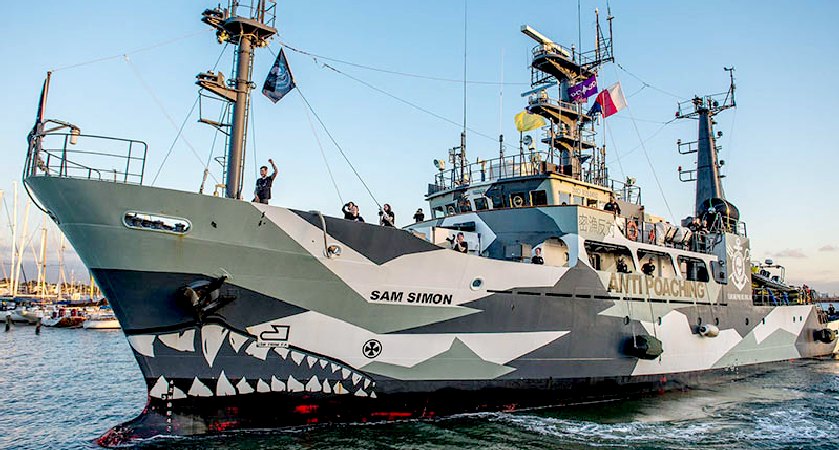
Stokes said he met with Jose Ramos Horta, the former president and former prime minister of Timor Leste, who is agitating for strong action to be taken against the crew.
Stokes said Sea Shepherd was monitoring the fleet, making sure they did not flee. He said they appeared to start moving overnight, but under the authority of the police, the Ocean Warrior threatened to damage their communication equipment with a
water cannon and they stopped.
In August, the same fleet was found with 300 tonnes of fish, mostly sharks including endangered hammerhead
sharks, in the Galapagos national park.
Stokes said Sea Shepherd was tracking two other vessels owned by another Chinese company, which they had observed fishing with nets that were 10km long, despite 2.5km being the maximum allowed by international law.
He said Sea Shepherd was increasingly working with authorities in third world countries, which did not have the resources to enforce protections in their oceans.
“They’re the ones getting their oceans pillaged by foreign vessels,” Stokes said. “It’s a new role for us the last couple of years. We’re hoping to roll it out over the whole of south-east Asia.”
By Michael
Slezak
THE
GUARDIAN 15
JANUARY 2017
Anti-whaling campaign group Sea Shepherd says it has photographed Japanese whalers carrying out a slaughter inside Australia’s Antarctic whale sanctuary, the same day the Japanese prime minister, Shinzo Abe, was in Australia on a state visit.
In the first documented killing since the international court of justice ruled Japan’s Antarctic whaling illegal in 2014, Sea Shepherd released photographs of what it says is a dead minke on the deck of the whaler Nisshin Maru at 11.34am on Sunday.
Sea Shepherd activists, who took the photos by helicopter after five weeks shadowing the Japanese whalers, said the Nisshin Maru crew tried to hide the slaughtered minke with a tarpaulin.
The whaling fleet’s harpoon ships Yushin Maru and Yushin Maru #2 then covered their harpoons, according to Sea Shepherd.
The photographs are also the first to document the Japanese fleet’s killing of whales since Australia’s federal court in 2015 found the industry was in contempt for killing protected whales in Australia’s declared sanctuary.
The court fined Japanese whalers $1m over the killings but the fines were ignored.
Abe left Australia on Sunday after a two-night stay in Sydney, which included meeting his counterpart, Malcolm Turnbull, on Saturday to discuss trade and security in Asia.
A spokesman for the Australian environment minister, Josh Frydenberg, was contacted for comment.
The Coalition has condemned Japan’s whaling activities and Turnbull was believed to have raised the issue privately with Abe, Fairfax has reported. But the government has resisted calls to send a government vessel to patrol its waters and intervene.
International law professor and whaling expert Tim Stephens has told the ABC that Australia could put a stop to whale hunting by taking Japan to the international tribunal for the law of the sea.
Stephens said the tribunal had “a system of mandatory dispute settlement” of which it would be difficult for Japan to opt out.
A spokesman for the Australian environment minister, Josh Frydenberg, was contacted for comment.
The Coalition has condemned Japan’s whaling activities and Turnbull was believed to have raised the issue privately with Abe, Fairfax has reported. But the government has resisted calls to send a government vessel to patrol its waters and intervene.
International law professor and whaling expert Tim Stephens has told the ABC that Australia could put a stop to whale hunting by taking Japan to the international tribunal for the law of the sea.
Stephens said the tribunal had “a system of mandatory dispute settlement” of which it would be difficult for Japan to opt out.
By Joshua Robertson
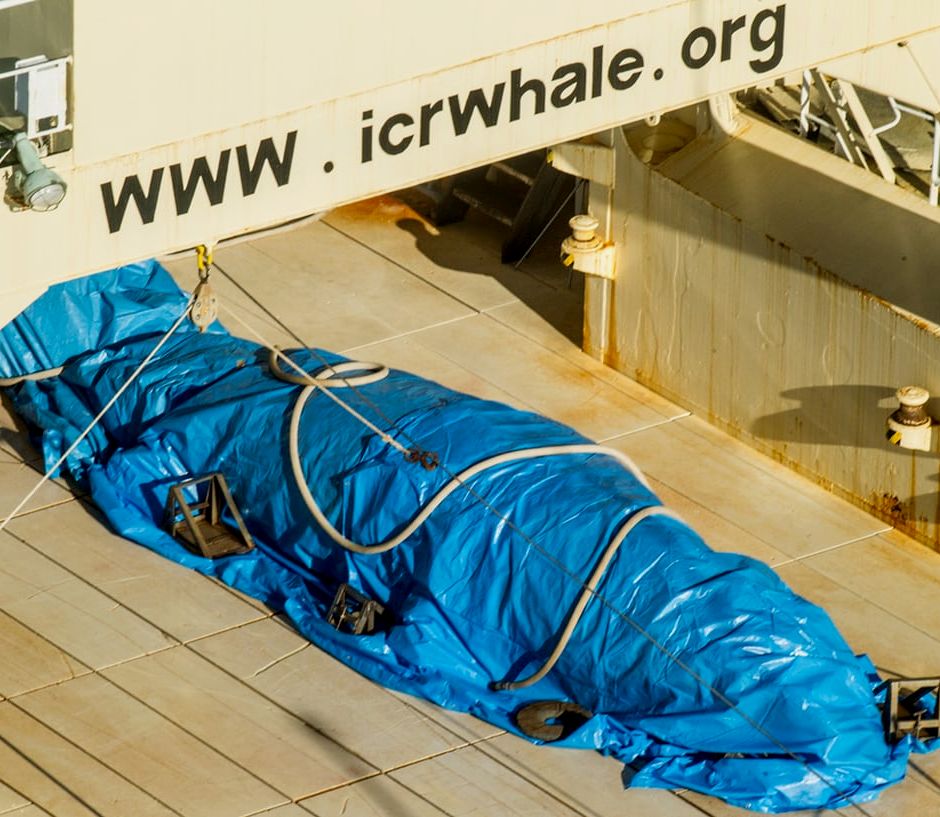
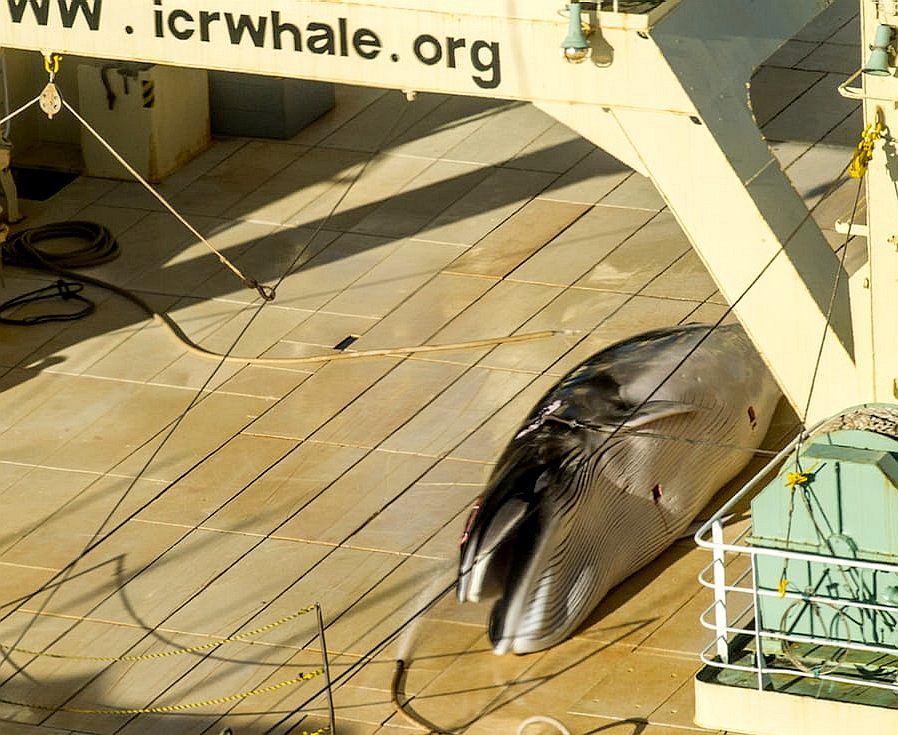
PHOTOGRAPHIC
EVIDENCE - These photographs were taken by helicopter from the Sea Shepherd ship, the Steve Irwin, the anti-whaling group said, providing coordinates to show it was inside the Australian whaling sanctuary.
Adam Meyerson, the captain of the Sea Shepherd patrol ship Ocean Warrior, said: “The whale killers from the Nisshin Maru were caught red-handed slaughtering whales in the Australian whale sanctuary.
“The Steve Irwin has shut down their illegal operations and caught them trying to hide the evidence.”
Jeff Hansen, the managing director of Sea Shepherd Australia, said a “lack of action by the Turnbull government” in response to the killing of whales in Australian waters on the tail of a state visit from Abe showed “the government has no spine when it comes to protecting the wishes of Australians to defend the Southern Ocean whale sanctuary”.
Wyanda Lublink, the captain of the Steve Irwin, said the whalers “know they are in contempt of the ruling of the international court of justice and the Australian federal court”.
“The fact that the Japanese crew went to cover up their harpoons and the dead minke whale on deck just shows that they know what they’re doing is wrong,” she said.
Sea Shepherd said in a statement on Sunday that the killing of whales had been halted after the helicopter relayed the whaling fleet’s position to the Steve Irwin, which was on course to intercept the factory ship.
Japan had previously caught hundreds of whales a year in Antarctic waters, eluding a worldwide moratorium on whale hunting under a “scientific” research program other nations regarded as a sham. The meat from the program, which is subsidised by the Japanese government, is sold in Japanese restaurants. But the whale meat, common in Japanese school lunches during the 1960s, now rarely figures in the diets of most Japanese.
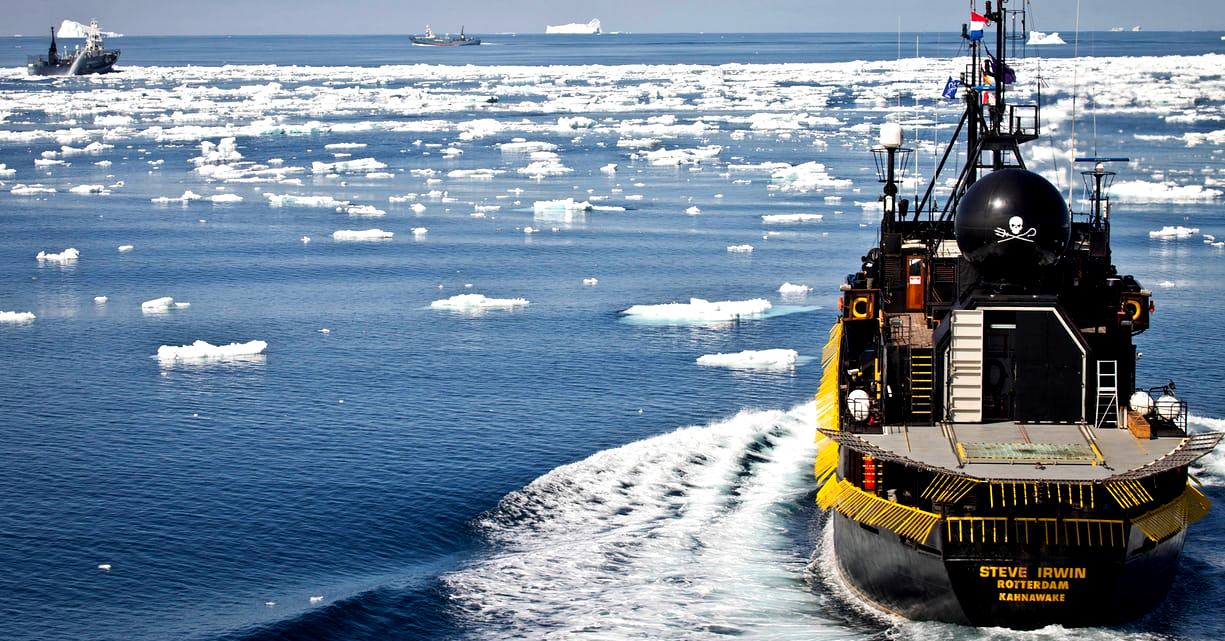
THE
GUARDIAN 29 AUG 2017 - The anti-whaling organisation Sea Shepherd will not contest the Southern Ocean against Japanese whalers this season, Captain Paul Watson has announced, accusing “hostile governments” in the US, Australia and New Zealand of acting “in league with Japan” against the protest vessel.
Sea Shepherd has been obstructing Japanese whaling vessels in the Southern Ocean each year since 2005, but Watson said the cost of sending vessels south, Japan’s increased use of military technology to track them, and new anti-terrorism laws passed specifically to thwart Sea Shepherd’s activities made physically tracking the ships impossible.
Australia took Japan to the international court of justice over its Southern Ocean whaling program in 2014, winning a judgment that condemned Japan’s whaling programs as being in breach of the International Whaling Commission’s ban on commercial whaling. The court rejected Japan’s argument that its whaling was for “scientific” purposes.
Watson said his volunteer organisation could not compete with Japanese military satellite technology, which tracked Sea Shepherd in the ocean. Japan has also passed anti-terrorism laws that make protest ships’ presence near whalers a terrorist offence.
“We’re just a group of volunteers trying to do the impossible, trying to do the job Australia and New Zealand and the United States and all these others countries should be doing but they’re too busy appeasing Japan.”
In a statement on Monday, Watson said the Japanese whaling companies “not only have all the resources and subsidies their government can provide, they also have the powerful political backing of a major economic superpower. Sea Shepherd however is limited in resources and we have hostile governments against us in Australia, New Zealand and the United States.”
Speaking on radio in Australia, Watson accused the Australian government of acting in league with Japan, indirectly supporting whaling by obstructing Sea Shepherd’s activities.
“Australia is definitely in league with Japan,” he said. “When our ships come in we’re harassed, we’re investigated, we’re searched, when our crew come in from other countries they have problems getting visas. We’ve been applying for charity status for 10 years – they won’t give it to us. This has been extremely hostile.
“Really what it’s all about is appeasing Japan. Trade deals take priority over conservation law.”
He said countries opposed to Japan’s whaling should have ships in the southern waters to monitor and deter whaling. “[They should] uphold their own laws, under US laws it’s illegal. Australia and New Zealand should be down there protecting their waters from poachers.”
Japan’s whaling in the Southern Ocean is illegal under international law. The US, Australia and New Zealand have all publicly, diplomatically and legally challenged Japan’s whaling program.
Aside from the ICJ challenge, Australia also pursued Japan in the Australian federal court in 2015, which fined the Japanese whaling company Kyodo $1m – a penalty that has not yet been paid.
Last month the New Zealand foreign affairs minister, Gerry Brownlee, said he was “extremely disappointed” Japan had passed new legislation to subsidise its whaling fleet and said he was concerned about Japan’s continued efforts to overturn the longstanding global moratorium on commercial whaling.
The US, Australia, New Zealand and the Netherlands were signatories to a joint statement in 2016, which accused the Japanese governments of flouting the ICJ order, and said: “Our governments remain resolutely opposed to commercial whaling.”
But that statement also warned anti-whaling activists against “dangerous, reckless or unlawful behaviour”.
The Sea Shepherd’s pursuit of whaling vessels has also attracted criticism. The Japanese government has described Sea Shepherd as “eco-terrorists” and sought to have Watson placed on an Interpol watch-list.
Security experts have criticised Sea Shepherd’s tactics at sea, saying they endanger lives.
And Sea Shepherd was fined for contempt of a US court for breaching an injunction not to physically attack or harass Japanese whalers.
In a statement issued on Tuesday, Watson said Sea Shepherd’s 12 years of action against Japan’s whalers had been successful, having seen 6,500 whales saved, not a single humpback killed, and only 10 endangered fin whales killed.
Japan’s whaling quota has been reduced from more than 1,000 whales a season to 333 a year.
Watson said Sea Shepherd would “never abandon the whales” but would formulate a new plan for contesting Japan’s whaling.
ABOUT
SEA SHEPHERD
The Sea Shepherd Conservation Society (SSCS) is a non-profit, marine conservation organization based in Friday Harbor on San Juan Island, Washington in the
United
States.
Sea Shepherd uses direct action tactics to protect marine life. The
organization was founded in 1977 under the name Earth Force Society by Paul Watson, a former member of
Greenpeace, after a dispute with that organization over what Watson saw as its lack of more aggressive intervention. The group has a strong focus on public relations to spread their message via the media. In 2008, Animal Planet began filming the weekly series Whale Wars based on the group's encounters with the
Japanese whaling fleet in the
Southern
Ocean, a development which brought the group much publicity.
Sea Shepherd currently operates the vessels MY Steve Irwin, the MY Bob Barker, the MY Sam Simon (donated by the founder of The Simpsons for the 2012 campaign) and the MV Brigitte Bardot. Operations have included scuttling and disabling whaling vessels at harbor, intervening in
Canadian and Namibian
seal hunts, shining
laser light into the eyes of whalers, throwing bottles of foul-smelling butyric acid onto vessels at sea, boarding of whaling vessels while at sea, and seizure and destruction of
drift nets at sea. Sea Shepherd claims that their aggressive actions are necessary as the international community has shown itself unwilling or unable to stop species-endangering whaling and fishing practices.
Sea Shepherd has received support for its tactics against fishing, whaling, and seal hunting from quarters such as media personalities, while their violent tactics are sometimes opposed even by those who denounce whaling, such as Greenpeace and the governments of Australia and New Zealand. Officials of the American, Canadian, and Japanese governments, as well as the Institute of Cetacean Research of Japan, have accused them of being eco-terrorists.


HISTORY
The predecessor organization of Sea Shepherd, the "Earth Force Society", was formed in 1977, after its founder, Paul Watson was ousted from the board of
Greenpeace for disagreements over his direct action activism which clashed with their pacifist ethos. Watson soon left Greenpeace. Initially without funding and with only a small group of supporters, in 1978 Watson managed to convince Cleveland Amory, head of the Fund for Animals to fund Watson's first vessel, the Sea Shepherd.
The first direct action undertaken by Sea Shepherd was against Canadian seal hunting in the Gulf of St. Lawrence in March 1979. Also in 1979, the group made headlines when, for the first time, they rammed a whaling vessel, the notorious pirate whaling vessel Sierra. Such acts continued with Sea Shepherd claiming responsibility for damaging or sinking multiple whaling vessels through sabotage or ramming. The group has attempted to intervene against
Russian,
Spanish, Norwegian, Icelandic, Makah, Faroese, and Japanese whalers in multiple campaigns around the globe. Setting a pattern that the group would keep up in later years, the group managed to scuttle a Portuguese
whaling vessel, though the first Sea Shepherd was impounded and lost. Watson says that he used the money gained from selling the story rights to fund his next vessel.
After having spent the 1980s undertaking a variety of controversial and dangerous operations in support of various marine conservation aims, in the 1990s the group has been described as having undertaken a shift in their public attitude. Having previously argued primarily from an ethical viewpoint, from the 1990s, Watson's group now also started ascribing themselves law enforcement powers, using its interpretation of maritime and conservation law, to describe themselves as an anti-poaching agency. In some cases in the 2000s, they cooperated with official government efforts against maritime poaching, such as in Costa Rican waters, though the agreements often did not last long before conflict ensued.
Starting in September 2010, Sea Shepherd Conservation Society has positioned a crew in Taiji, Japan to monitor and report their annual dolphin drive hunt.
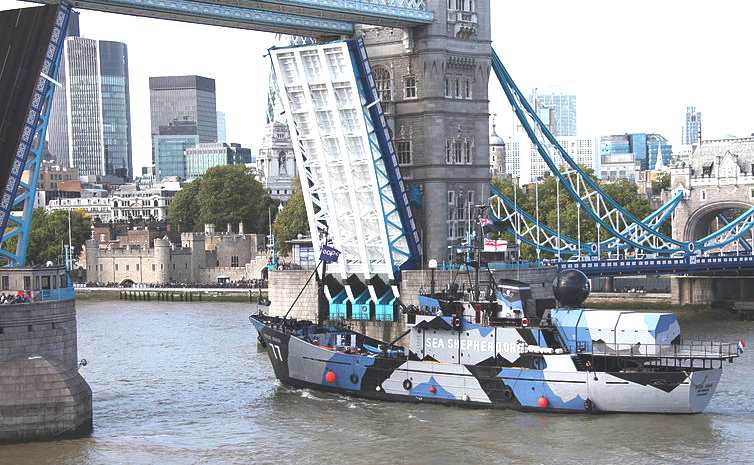
ORGANIZATION
Sea Shepherd is a non-government environmental organization and in the United States has a 501(c)(3) tax exempt status. 83.2% of the organization's revenue is spent on its programs, while 16.7% of revenue is spent on administrative and fundraising. It is supported by private and corporate donations, lectures by Watson, internet advertising, and grants. The group is operated by volunteers and a small paid staff. Watson says he is committed to keeping his organization small, and does not believe in spending money on fund-raising or recruitment.
Sea Shepherd is governed by a board of directors, including Watson. The organization has several boards of advisers, each addressing an area of expertise. The Scientific, Technical, and Conservation Advisory Board includes Earth First! founder Dave Foreman and Horst Klienschmidt, a former Deputy Chair of the International Whaling Commission (2006). The Legal and Law Enforcement Advisory Board includes Ian Campbell, a former Australian Minister of the Environment and Heritage (2004–07) whom whaling groups had accused of having inappropriate and close ties with the organization. The Animal Welfare, Humane and Animal Rights Advisory Board includes animal rights philosopher Tom Regan. The Media and Arts Advisory Board includes several major Hollywood stars. There is a Photography Advisory Board and a Financial and Management Advisory Board.
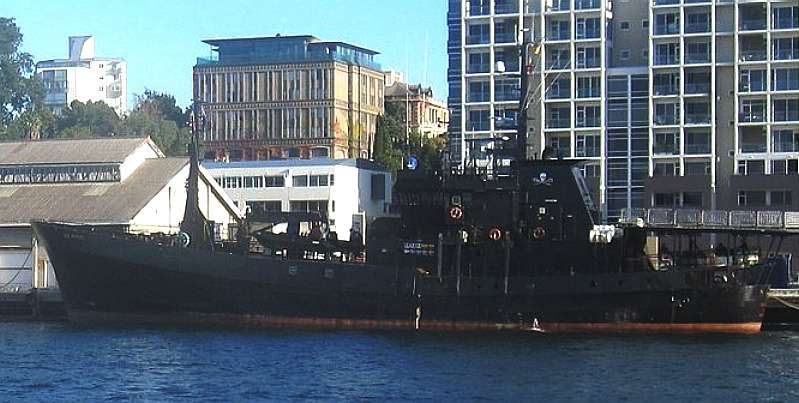
ACTIVISM
Sea Shepherd engages in conventional protests and direct actions to protect marine wildlife. Sea Shepherd operations have included interdiction against commercial fishing, shark poaching and finning, seal hunting, and whaling. The group has been active in intervening against fishing and poaching in the South Pacific, the Mediterranean, and in waters around the Galapagos Islands.
According to its mission statement, Sea Shepherd Conservation Society "uses innovative direct-action tactics to investigate, document, and take action when necessary to expose and confront illegal activities on the high seas". Those actions have included scuttling and disabling commercial whaling vessels at harbor, ramming other vessels, throwing glass bottles of butyric acid on the decks of vessels at sea, boarding of whaling vessels while at sea, and seizure and destruction of drift nets at sea. As of 2009, Paul Watson has said that the organization has sunk ten whaling ships while also destroying millions of dollars worth of equipment. Their practice of attacking and sinking other ships has led to reports of injuries to other sailors as well as the Sea Shepherd crew, including concussions and complications from chemical attacks.
Watson considers the actions of Sea Shepherd to be against criminal operations and has called the group an anti-poaching organization. Critics claim that Sea Shepherd's actions constitute violations of international law, while Watson has stated that Sea Shepherd believes that their actions constitute an attempt to enforce international conservation laws and international maritime law under the World Charter for Nature adopted by the United Nations . Australia has declared Japan's hunt in the Southern Ocean Whale Sanctuary to be illegal, and federal court judge Jim Allsop has stated "there is no practical mechanism by which orders of this court can be enforced." The lack of official enforcement mechanisms in that law prompted the Society to adopt, without official sanction, what it sees as a law enforcement mission. A 2008 academic paper by researchers at Monash University in Melbourne, Victoria concluded that the group "may be best categorized as a vigilante group, because they say they are seeking to enforce a legal status quo because of states' and the international community's inabilities or unwillingness to do so."
Watson left Greenpeace in 1977 after being expelled from the board of directors due to his confrontational methods. Since then, Greenpeace has criticized Sea Shepherd for the group's tactics, particularly regarding its interaction with whaling ships while at sea. The rival environmental group maintains Sea Shepherd is a violent organization whose tactics may endanger the lives of fishermen and whalers. Greenpeace has called Watson a violent extremist and will no longer comment on his activities. Greenpeace is also critical of the group on its website and state: "By making it easy to paint anti-whaling forces as dangerous, piratical terrorists, Sea Shepherd could undermine the forces within Japan which could actually bring whaling to an end". Both groups protest the Japanese whale hunts in the Southern Ocean but Greenpeace has a policy to not assist Sea Shepherd in finding the whalers. In his 2009 book, Whaling in Japan, Jun Morikawa states that Sea Shepherd's confrontational tactics have actually strengthened Japan's resolve to continue with its whaling program. According to Morikawa, Sea Shepherd's activities against Japan's whaling ships have allowed the Japanese government to rally domestic support for the program from Japanese who were otherwise ambivalent about the practice of hunting and eating whales.
Sea Shepherd has been criticized and sometimes physically attacked by people in several of the countries they protest against. In March 1995, a mob of Canadian seal hunters stormed the hotel where members were staying. They fled while the mob ransacked their room. In November 1998, Makah seized an inflatable boat belonging to the group and threw rocks at the Sea Shepherd's Sirenian in response to protests over their whale hunt. In 2005, 11 Sea Shepherd crew were involved in an altercation with sealers while on the ice. The sealers were not charged with any crime, but the activists were arrested and later convicted for approaching too close to the hunt. In 2008, fishermen in the French islands of Saint Pierre and Miquelon cut the mooring lines of the Farley Mowat after hearing Watson make disparaging comments about the deaths of four seal hunters. In February 2010, pro-whaling demonstrators gathered outside the Australian Embassy in Tokyo to protest the group. A political activist said that Sea Shepherd's actions were "absolutely racial discrimination against Japanese people." In response, Sea Shepherd stated that they also oppose whaling in the Faroe Islands, sealing in Canada, etc. In response to the events of the sinking of the Ady Gil in January 2010, Glenn Inwood, whose firm handles public relations on behalf of the Japanese Institute of Cetacean Research, accused Sea Shepherd of being "hostile eco-terrorists".
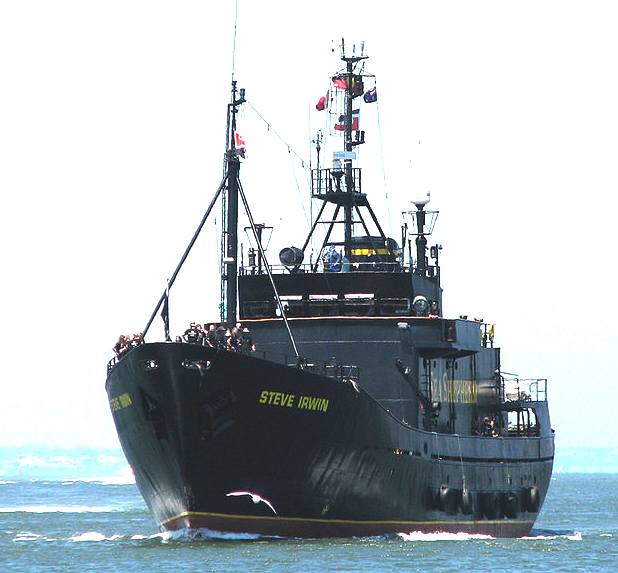
PUBLIC RELATIONS
The Sea Shepherd Conservation Society has received attention from the press and been called "media savvy". The group has worked with journalists and has made statements through press releases to spread its message during various campaigns.
Watson's public relations savvy is shown in an episode of Whale Wars when he creates an international "media storm" after two crewmembers are detained on a Japanese whaling vessel. In his book, Earthforce!, Watson advises readers to make up facts and figures when they need to, and to deliver them to reporters confidently. He also states that the "truth is irrelevant" due to the nature of mass media. In response to criticism that he manipulates the media, Watson has stated: "What we do is provide the media with the kind of stories they can't resist... and this is how we bring attention to what's happening to the whales, the seals, the sharks and the other marine conservation campaigns we're involved in."
Sea Shepherd has also used satellite uplinks, webcams, and internet blogging during its operations in the Southern Ocean, and has invited the media to ride along. In 2006, representatives from Seven network and National Geographic magazine, along with documentary filmmakers, accompanied the group. In a television series entitled Whale Wars, Discovery Communications, Inc. documented Sea Shepherd's 2008/09 Antarctic campaign against Japanese whalers, following events on the Steve Irwin. The program premiered on November 7, 2008, on Discovery's Animal Planet network.
Sea Shepherd has received financial contributions from celebrities and businessmen such as entrepreneur Steve Wynn, television personality Bob Barker, and John Paul DeJoria, as well as other celebrities. Martin Sheen, Daryl Hannah, and Richard Dean Anderson have joined the group during protests. Actors including Edward Norton, Pierce Brosnan, Christian Bale, and Emily Deschanel have supported the group through contributions, while William Shatner has also been mentioned as supporting the group. In 2007, actor Heath Ledger conceived and directed a music video of the Modest Mouse song "King Rat", intended to raise awareness of the whale hunts taking place each year off the coast of his native Australia. Although Ledger died before the video could be completed, others finished it in his honor and debuted the video online in August 2009. Proceeds from iTunes sales of the video in its first month of release were donated to Sea Shepherd.
From the music industry, Anthony Kiedis of the Red Hot Chili Peppers, Leona Lewis, Rick Rubin, and the groups The Red Paintings and Gojira have financially supported Sea Shepherd. In 2009, professional surfer Kelly Slater joined a Quiksilver Australia/Sea Shepherd partnership featuring a fund-raising clothing line, including board shorts designed by Slater.
The Lush cosmetics company joined with Sea Shepherd to raise awareness about the practice of shark finning in 2008. Lush produced 'Shark Fin Soap' (punning on 'shark fin soup'); all sale proceeds were directed to Sea Shepherd. To launch the soap and awareness campaign a performance artist suspended herself, using hooks in her flesh, in a Lush shopfront window in London.
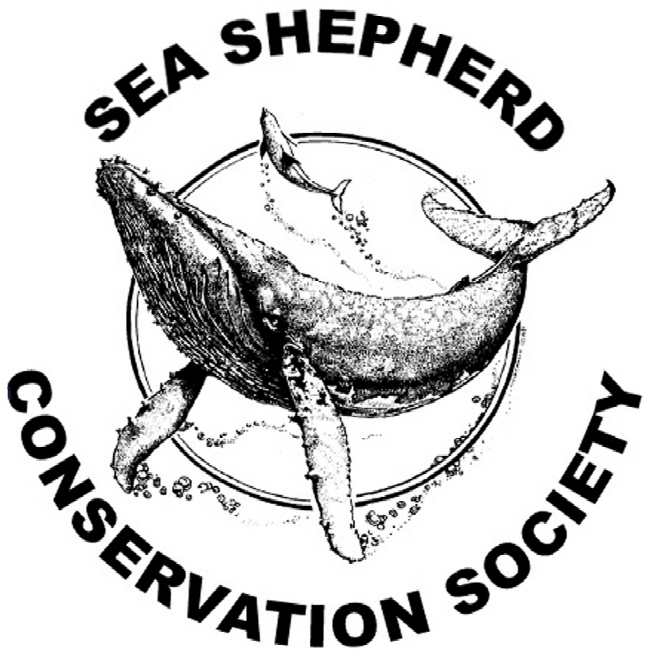
GOVERNMENTS
In testimony on "The Threat of Eco-Terrorism" given to the a US congressional subcommittee in 2002, Sea Shepherd was the first group mentioned by an FBI official for having attacked commercial fishing operations by cutting drift nets. An earlier Canadian intelligence report on "single issue terrorism" stated that "Watson and his supporters have been involved in a number of militant actions against whale hunting, driftnet fishing, seal hunting and other related issues" and mentions "activities against logging operations in Canada". In 2007, Ian Campbell, then the Australian Environment Minister and a vigorous critic of Japan's whaling, once opposed Sea Shepherd's tactics, saying that it really put the cause of conservation backwards. Due to the 2008 operations against Canadian seal hunters, Danny Williams, Premier of Newfoundland and Labrador, called Watson a terrorist and said that Sea Shepherd was not welcome in the province. The group has been accused of eco-terrorism by the Japanese government.
Sea Shepherd has based many of its operations out of Australia with foreign crew members being able to travel in and out of the country on tourist visas. Tasmanian Greens and the former Greens Senator Bob Brown, have endorsed and supported the Society in various ways, including advocacy within the Australian government and public endorsement of the group. However, Nationals Party Senator Barnaby Joyce has opposed granting Sea Shepherd tax-exempt status stating that "Criminals should not get tax concessions – if you break the law, then donations to your organisation should not be tax deductible".
When the Steve Irwin returned to Hobart, Tasmania in February 2009, Australian Federal Police seized film footage and the ship's logs, reportedly prompted by complaints from Japan. Brown demanded that the Australian Prime Minister, Kevin Rudd, order their immediate return, but a spokesman for the Home Affairs Minister said it was a federal police matter.
In October 2009, The Australian Immigration Department ruled that Watson and his First Officer, Peter Hammarstedt, must satisfy new good-character requirements to obtain business visas, requiring them to provide police references from the governments of the United States, Canada and Norway. Watson criticized what he considered a submission to Japanese pressure by the Rudd government. The Australian government responded by rejecting the idea that it was in some way delaying Watson, and on October 20, 2009 issued visas to Watson and Hammarstedt.
Paul Watson said to Discovery Channel the Dalai Lama sent a letter of support for Sea Shepherd's volunteers accompanied by a wrathful, scowling statue of the deity Hayagriva, which expresses compassion and determination in overcoming obstacles. In 2010 during a visit to Japan, the Dalai Lama said that while he agrees with the goal of stopping Japan from hunting whales, they should stop using violent methods to achieve that goal.
The ships of the fleet have flown the flags of different nations and the opinion of several governments that the vessels are engaged in inappropriate activities has several times led to registration issues for Sea Shepherd vessels. Canada, Belize, UK and Togo have revoked the registrations of various vessels. Both the Steve Irwin and Bob Barker ships now sail under Dutch flag leading to direct complaints by the Japanese government towards Dutch ambassadors. The Netherlands consequently considered revoking the registrations for both vessels but finally decided not to do so.
Officials in Japan have discussed revoking the group's tax exempt status with their counterparts in the United States.
In December 2011, the Institute of Cetacean Research (ICR) and Kyodo Senpaku Kaisha Ltd, the two Japanese organizations which operate Japan's whaling program, sued Sea Shepherd Conservation Society (SSCS) in U.S. federal district court in Seattle. The suit requested an injunction to stop Sea Shepherd's operations against Japanese whalers. The suit was filed in Seattle because Sea Shepherd is based in the state of Washington. The federal court denied the ICR's preliminary injunction against SSCS. The ICR and Kyodo Senpaku appealed and, on December 17, 2012, the United States Court of Appeals for the Ninth Circuit issued an injunction against Paul Watson, Sea Shepherd and any party acting in concert with them from physically attacking any person or vessel of the ICR and requiring them to stay at least 500 yd (457 m) from their vessels. After the court ruling, Paul Watson stepped down and Bob Brown succeeded his role as the leader of SSCS. Sea Shepherd appealed to the US Supreme Court to have the injunction set aside, but the appeal was rejected. On February 26, 2013, the Court of Appeals maintained the injunction, stating that SSCS's activities were "the very embodiment of piracy."
In March 2012, reacting to Paul Watson's allegation that Maltese politicians were bribed by the Bluefin tuna industry, Prime Minister of Malta Lawrence Gonzi announced that the government would initiate libel proceedings against the Sea Shepherd founder.
In May 2012, Watson was detained by German authorities after he arrived at the Frankfurt Airport based on a request from the government of Costa Rica. The charge stemmed from an altercation in 2002 in which Sea Shepherd contends that the other vessel was shark finning in Guatemalan waters. Members of the other involved ship said that Sea Shepherd was trying to kill them. Watson was charged with violating navigational regulations. The conflict took place during filming for the documentary Sharkwater. Watson subsequently skipped bail and went into hiding at the end of
July. Watson's lawyer has confirmed that he has fled the country.[88] Upon the breach of the bail conditions, the Costa Rican government requested the International Criminal Police Organization (Interpol) to issue a Red Notice (an arrest request to member countries), which was granted by Interpol.

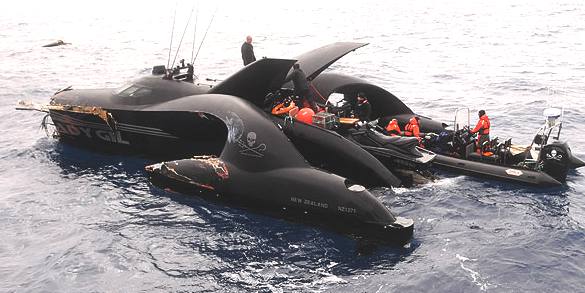
The
Japanese have declared war on whaling protestors. It's about time the
protestors put a boat in the water to counter such aggressive acts. An eye
for an eye and a tooth for a tooth. Since, turning the other cheek has not
stopped the Japanese fish markets from selling whale meat. Where do you
suppose the meat is coming from?
NEPTUNE'S NAVY
Sea Shepherd refer to the ships it has operated as Neptune's Navy. The society operates four ships, the MY Steve Irwin, the MY Bob Barker, the MY Sam Simon and the MV
Brigitte Bardot, as well as smaller vessels such as RHIBs.
The Steve Irwin was obtained in 2007 and originally called the Robert Hunter. It was renamed in honor of The Crocodile Hunter star Steve Irwin. His widow, Terri, gave her support to Sea Shepherd, saying: "Whales have always been in Steve's heart and in 2006 he was investigating the possibility of joining the Sea Shepherd on part of its journey to defend these beautiful animals." The other ship, the 1200 ton Bob Barker, was named after famous television game-show host and animal activist Bob Barker, who made the purchase in Ghana of the retired Norwegian whaling vessel possible with a donation of US$5
million. In February 2010, the Bob Barker collided with the Japanese whaling vessel Yushin Maru No. 3, tearing a gash in the hull of the Bob Barker.
The group also formerly operated the Farley Mowat (impounded by the Canadian government, with Sea Shepherd having stated that they have no intention of paying the legal fines and berthage fees to recover their now obsolete vessel) and the Ady Gil, formerly known as the Earthrace (sunk after a collision with the MV Shōnan Maru 2 whaling security vessel in early 2010) as well as a number of earlier vessels.
Sea Shepherd acquired the Ocean 7 Adventurer for its 2010/11 campaign against Japanese whaling in the Antarctic. In November 2010, mayor Brad Pettitt of Fremantle, Western Australia, christened the vessel Gojira with Fremantle as its home town, making this the first Sea Shepherd ship registered in Australia, with an Australian crew. The Gojira was renamed MV Brigitte Bardot in May 2011 after complaints of copyright infringement by the owners of the "Gojira" copyright.
For the 2011/12 Antarctic campaign, the organization acquired non-weaponized drone aircraft to assist in their surveillance of the whaling ships.
In July 2012 Sam Simon, a co-creator of The Simpsons, was reported to donate money to purchase the fourth vessel, a former German icebreaker. The actual ship however turned out to be a former Japanese weather survey vessel, now called the MY Sam Simon.
THE
FUTURE
Direct
action relies on monitoring illegal fishing activities. Neptune's Navy is
already using state of the art drones. Perhaps one day they may consider
using Zero
Carbon Cruisers, as the opportunity arises to acquire additional
muscle.
BOOKS BY SSCS MEMBERS
David B. Morris, Earth Warrior: Overboard with Paul Watson and the Sea Shepherd Conservation Society (Golden, CO: Fulcrum Publishing, 1995). ISBN 1-55591-203-6
Rik Scarce, Eco-Warriors: Understanding the Radical Environmental Movement, second revised ed. (1990; Left Coast Press, 2005), Ch. 6. ISBN 978-1-59874-028-8
Paul Watson, Earthforce! An Earth Warrior's Guide to Strategy (Los Angeles: Chaco Press, 1993). ISBN 0-9616019-5-7
Paul Watson, Ocean Warrior: My Battle to End the Illegal Slaughter on the High Seas (1994; Key Porter Books, 1996). ISBN 978-1-55013-599-2
Paul Watson, Seal Wars: Twenty-five Years in the Front Lines with the Harp Seals (2002; Firefly Books, 2003). ISBN 978-1-55297-751-4
CONTACTS
Campaigns and Ocean
Issues
|
|
Campaign
questions and suggestions
campaigns@seashepherd.org
|
Questions or suggestions
about the tactics we use or issues we are working on
Note: While we appreciate
the suggestions, please understand that we may not be able
to respond to all e-mails.
|
|
Inform
us of violations against
ocean wildlife
inform-us@seashepherd.org
|
Only for confidential
information (such as activity, location, coordinates,
etc.) that will help us in our efforts to protect marine
wildlife -- you may submit it to us confidentially
Example: Let us know if
you know where the Japanese whaling fleet is located
Click
here for our PGP key
|
Donations / Merchandise
/ General
|
|
Donations
donations@seashepherd.org
|
Check about donations
previously made; inquire about donating either cash or
material items; general questions about how to support us
Visit our Donate
Page to donate by credit card online.
|
|
Planned
Giving and Estate Planning
plannedgiving@seashepherd.org
|
Inquire about how to
become a member of the Shepherds Forever Society; how to
include Sea Shepherd in your will
|
|
Merchandise
store@seashepherd.org
|
Check on status of an
existing order. To order merchandise online visit
our store
|
|
General
info@seashepherd.org
|
Don’t see a specific
address above for your question? Then send it here!
|
Speaking Engagement /
Public Appearance for Captain Paul Watson
|
|
Schedule
a lecture
|
If you would like to have
Captain Watson speak at your event please contact Bethany
Dick at William Morris Endeavor Entertainment (WME) at BD@wmeentertainment.com
Visit the WME
Speakers page
|
International Contacts
& Offices:
 |
|

|
US
HEADQUARTERS
PO Box 2616
Friday Harbor WA 98250
USA
Tel: +1-360-370-5650
Fax: +1-360-370-5651
E-mail: info@seashepherd.org
|
|

|
GALAPAGOS
/ ECUADOR
Sea Shepherd
Galapagos
Calle Indefatigable s/n Isla Plazas
Puerto Ayora, Isla Santa Cruz, Galápagos, Ecuador
011-593-5-252-4676
e-mail: galapagos@seashepherd.org
|
|

|
SINGAPORE
/ ASIA
Block 503 #02-237
Pasir Ris St. 52
Singapore 510503
Tel: 65-9 684 0950
E-mail: grant@seashepherd.org
|
|
|
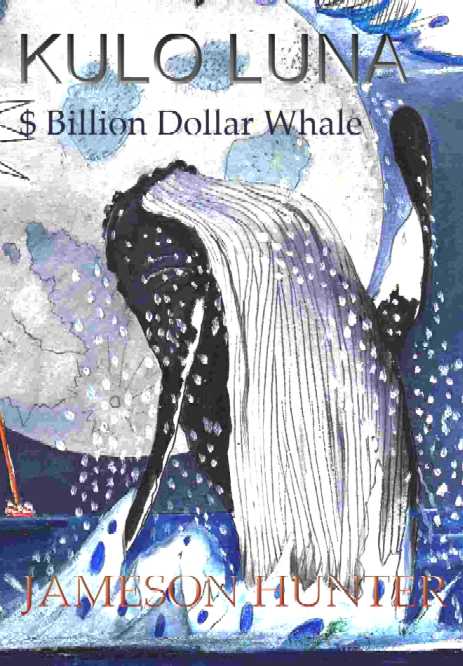
ACIDIFICATION
- ADRIATIC - ARCTIC
- ATLANTIC - BALTIC
- BERING - CARIBBEAN
- CORAL - EAST
CHINA
ENGLISH
CH - GULF MEXICO - INDIAN
- MEDITERRANEAN - NORTH
SEA - PACIFIC - PERSIAN
GULF - SEA JAPAN
STH
CHINA - PLASTIC
- PLANKTON - PLASTIC
OCEANS - SEA
LEVEL RISE
LINKS
& REFERENCE
https://www.theguardian.com/environment/2017/sep/14/shark-hunt-sea-shepherd-activists-bring-timor-leste-police-to-chinese-owned-boat
https://www.theguardian.com/environment/2017/jan/15/photos-japanese-whalers-killing-minke-sanctuary-says-sea-shepherd The
terramar project-sea-shepard-activists-detain-illegal-chinese-shark-fishing-boats-timor-leste-police http://theterramarproject.org/thedailycatch/sea-shepard-activists-detain-illegal-chinese-shark-fishing-boats-timor-leste-police/
http://en.wikipedia.org/wiki/MV_Brigitte_Bardot
http://en.wikipedia.org/wiki/MY_Steve_Irwin
http://en.wikipedia.org/wiki/MY_Bob_Barker
http://en.wikipedia.org/wiki/MY_Sam_Simon
http://en.wikipedia.org/wiki/Sea_Shepherd_Conservation_Society http://www.seashepherd.org/ Transcend
Sea Shepherd Brigitte Bardot damaged by rogue wave Japanese whalers
https://twitter.com/SeaShepherd
http://www.dimdex.com/en/warship-display.aspx http://www.npp.com.qa/ http://en.wikipedia.org/wiki/Qatar_Armed_Forces
http://www.asdwire.com/press-release-8988/ http://www.maritimeaustralia.com.au/ http://www.pacific2013.com.au/innovation-awards/index.html Kestrel
Marine's Sentient object recognition
system Maritime
Australia Limited Pacific
2013 Awards
|













